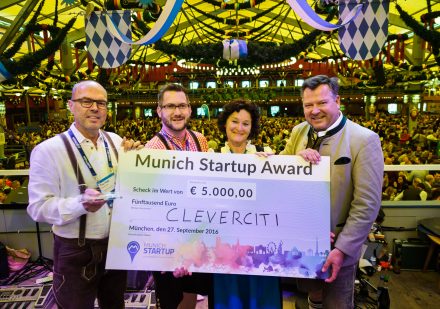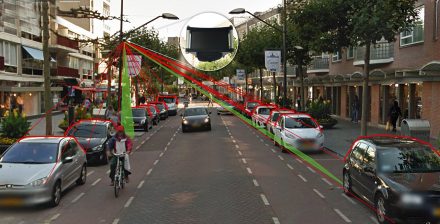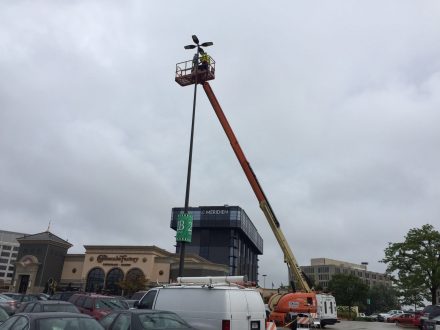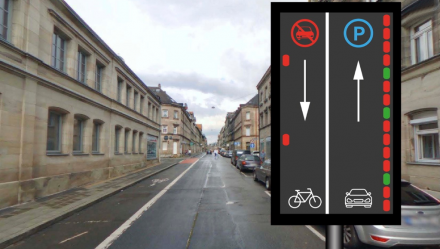The Munich startup Cleverciti Systems offers cities and parking lot operators a smart and efficient solution for parking lot management using their sensor technology.
Thomas Hohenacker, founder and CEO of Cleverciti.
“The aim is to replace the medieval system of ‘luck’ for finding a parking space with the efficient use of data,”
said Thomas Hohenacker, founder and CEO of Cleverciti Systems GmbH.
An award-winning business idea

Cleverciti has already won several awards with their idea, including the 2016 Munich Startup Award and the Special Innovation Award of the 2016 Technology Fast 50 Award. The company is also the 2017 German Accelerator winner.
Drivers receive data from an app or a parking guidance system about where parking spots are available or, as may be the case, currently unavailable. This makes it possible to reduce the negative impact of search traffic, which makes up for roughly 30% of the total traffic in downtown areas.
According to Cleverciti, the “average” driver spends three years of their life looking Thomas Hohenacker, Gründer und Geschäftsführer von Cleverciti. for a parking spot. As Hohenacker found himself “blindly” looking for a parking spot and simply hoping for a lucky opening, he decided to found his smart data company.

Cleverciti offers smart city solutions for parking
Launched in 2012, Cleverciti’s sensor technology is mounted on lamp posts or buildings. Every second, the sensors scan parking spots along the street or in parking garages and send data about the occupancy status in real time to parking operators and drivers. The sensors have a range of up to 400 meters and measure both the GPS position and the size of the available spot.
The advantage? The size of the parking spot does not have to be plotted ahead of time, installation is complete within half an hour, and up to 300 parking spots can be covered. In contrast to in-ground sensors, construction sites do not pose a problem if streets have to be torn up.

While many different options are available for efficiently managing city parking, Hohenacker feels confident about the approach his company takes:
“For cities to be able to manage the valuable real estate known as parking, they also have to be able to monitor it. We offer the best solution with the furthest range for just that. We do not have any competitors at the moment when it comes to efficiency and reliability.
The company has already applied for a patent for their parking solution, and additional ideas are being developed for patent registration as well.
A focus on B2B customers

The IT startup concentrates on two target groups: town councils and private parking lot operators. Based on experience with town councils, the length of time necessary to make decisions can be a problem.
In the corporate area, that time period is much shorter since decisions are ideally made by just one person. When considering the second group of customers, Cleverciti is particularly interested in airports and shopping malls. For one, they want to reduce CO2 emissions, and also want to offer their customers improved on-site service to avoid losing them to online retail.
The USA in particular has major opportunities to offer, which is why the Munich startup plans to open an office in Chicago this summer to tap into the American market. Hohenacker proudly explained:
“We just recently concluded a contract with the second largest shopping mall chain in the US, and have just started to equip the first shopping mall in Boston with our smart parking solution.”
Challenge #1: Being accepted as a reliable partner. Fly your flag!
It is generally helpful when negotiating to be extremely patient and always make yourself seen. For a startup, it is also a matter of demonstrating that you can be a reliable partner.
That explains why from a total of roughly 30 employees at the young Munich company, five now work in sales. They plan to visit twelve trade shows in 2017. That is not without reason, considering that Cleverciti has acquired 50% of its clients through trade shows. Hohenacker explained further:
“We went to a very large number of trade shows in the last one and a half years. That is because it is extremely important as a young company to fly your flag.
Clients need to know that we are here and are here to stay! Being at trade shows is very important to us, because it shows that we ‘are part of the family’.”
Challenge #2: Smart parking around the world. With the right partners!

The strategy worked. The startup now has more than 15 systems installed worldwide: near Brisbane (Australia), in Vancouver (Canada), and soon in Kingston, Jamaica – not to mention in Germany in Bad Hersfeld. The company is also currently negotiating with the City of Munich. Quite an amount of new business is also in the pipeline. Requests are coming in from Taiwan, Japan and Singapore. The almost exotic diversity of the requests surprised the startup.
That is also because such a strong international presence presents a major challenge. After all, every one of their international clients also has to be cared for properly. Because the startup is not necessarily able to manage that on their own, Hohenacker said that “it is important to find the right strategic partners on an international scale.”
Challenge #3: Getting even faster. Thanks to more capital!
To make sure the Munich startup can pick up speed, Hohenacker is currently conducting intensive negotiations with VCs.
“A major challenge for us is trying to speed up negotiations with town councils. We expect to complete our series B round of financing by the end of this year, which should enable us to intensify development of international marketing and sales.”
The ultimate goal is to lead in the field of parking logistics – and to do so on a global scale. The Munich-based startup seems to be well on its way.
Hohenacker was once given a good piece of advice that was and continues to be helpful:
“You have to be patient as a startup. Building a successful company does not happen overnight.”
Copyright for the photos: Cleverciti Systems



